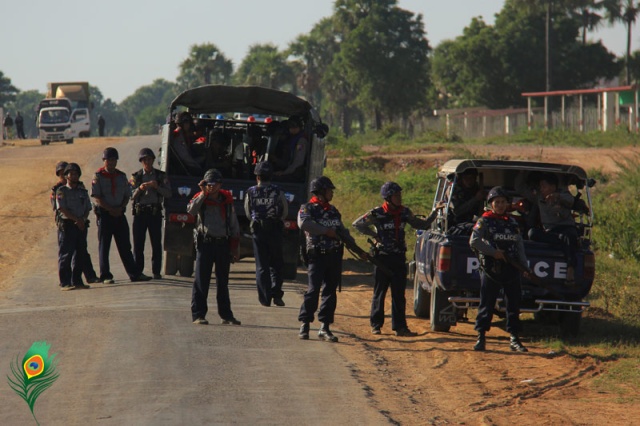“Burma’s reforms over the past year are hindered, not helped, by international oversell and hasty praise in the face of continued serious human rights abuses,” says Phil Robertson, the deputy Asia director at Human Rights Watch. “No one expects that a rights-respecting democracy will arrive overnight, but Burma is still failing basic rights tests on its remaining political prisoners, blocked humanitarian aid, and ensuring accountability for war crimes.”

Security police are pictured around the copper mine project area on Monywa-Pathein Road following a crackdown on protesters the night before. (PHOTO: Hein Htet/Mizzima)
Rights Watch released its 665-page World Report 2013 on February 1 in which it said that Burma’s human rights situation “remained poor, despite some noteworthy actions by the government to adopt rights-respecting reforms.”
The report noted that in 2012 the Burmese government released nearly 400 political prisoners, relaxed media censorship, and permitted the opposition National League for Democracy party to assume the 43 parliamentary seats it won in April’s by-election.
However, the New York-based watchdog said that the government had failed to hold security forces accountable for serious abuses against civilians in Kachin State and Rakhine State. It also said the delivery of humanitarian aid to tens of thousands of displaced people in both crisis areas was obstructed by the authorities.
HRW also noted that Burmese security forces had cracked down on peaceful demonstrators in Rangoon and elsewhere over the past year.
“Laws that have been used to imprison peaceful activists, lawyers, and journalists remain on the books, including, among others, the Unlawful Associations Act, the Electronics Act, the State Protection Act, and the Emergency Provisions Act,” the report said. “While Burmese President Thein Sein released an estimated 400 political prisoners in 2012 in general amnesties, as many as several hundred more political prisoners remain in prison. Freed political prisoners face restrictions on travel and education, and lack adequate psychosocial support.”
And the report noted that despite the serious ongoing abuses, several foreign governments – including the United States and the United Kingdom – continued their expressions of optimism about political reforms while prematurely easing or lifting political and economic sanctions against Burma.
“The US, UK and other influential governments should hold Burma to the human rights commitments it made during last year’s well-publicized international visits,” Robertson said. “Systematically releasing the remaining political prisoners and opening a UN rights office are key benchmarks. Foreign governments should recognize that Burma’s history shows that a tough response to rights abuses doesn’t derail reform, but promotes it.”


